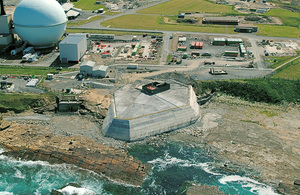A new Bill to protect jobs and trade across the whole of the United Kingdom after the Transition Period ends will be introduced to parliament today (Wednesday 9 September).
The UK Internal Market Bill will guarantee companies can trade unhindered in every part of the UK as they have done for centuries, ensuring the continued prosperity of people and business across four parts of the UK, while maintaining our world-leading high standards for consumers, workers, food, animal welfare and the environment.
From 1 January 2021, powers in a range of policy areas previously exercised at an EU level will flow directly to the devolved administrations in Holyrood, Cardiff Bay and Stormont for the first time. This will give the devolved legislatures power over more issues than they have ever had before, including over air quality, energy efficiency of buildings and elements of employment law, without removing any of their current powers.
Once the Transition Period ends, rules that have regulated how each home nation trades with each other over the past 45 years will fall away. Without urgent legislation to preserve the status quo of seamless internal trade, rules and regulations set in Scotland, England, Wales and Northern Ireland could create new barriers to trade between different parts of the UK, unnecessary red tape for business and additional costs for consumers. Data shows that the combined total sales from Scotland, Wales and Northern Ireland to the rest of the United Kingdom were worth over £90 billion in 2018.
Today’s Bill will avoid this uncertainty for business by creating an open, fair, and competitive market across the United Kingdom, ensuring regulations from one part of the country will be recognised in another. Each devolved administration will still be able to set their own standards as they do now, while also being able to benefit from the trade of businesses based anywhere in the UK. The rules in this bill will also bind the UK Government when acting on behalf of England in areas of devolved competence.
Business Secretary Alok Sharma said:
For centuries the UK’s internal market has been the cornerstone of our shared prosperity, delivering unparalleled stability and economic growth across the Union.
Today’s Bill will protect our highly integrated market by guaranteeing that companies can continue to trade unhindered in every part of the UK after the Transition Period ends and EU law falls away.
By providing clarity over rules that will govern the UK economy after we take back control of our money and laws, we can increase investment and create new jobs across the United Kingdom, while our maintaining world-leading standards for consumers, workers, food and the environment.
Without these necessary reforms, the way we trade goods and services between the home nations could be seriously impacted, harming the way we do business within our own borders. Now is not the time to create uncertainty for business with new barriers and additional costs that would trash our chances of an economic recovery.
Scottish Secretary Alister Jack said:
We are taking action to protect the vital UK internal market, while respecting and strengthening devolution, by ensuring that goods can continue to travel barrier-free through the UK when the Transition Period ends.
Without this legislation there would be a serious risk to our jobs and businesses which is not surprising given the rest of the UK is Scotland’s biggest market, worth £55 billion a year, and a massive sixty per cent of all our exports.
EU powers are also being returned to us so we can further invest in communities and businesses in Scotland to help us bounce back from the economic shock of coronavirus.
Our proposals to safeguard the UK internal market are complementary to our ongoing work to develop UK-wide frameworks and I hope the devolved administration will work with us as we take this forward.
The Bill will also enable the UK Government to provide financial assistance to Scotland, Wales, and Northern Ireland with new powers to spend taxpayers’ money previously administered by the EU. From January 2021, the UK will be able to invest in communities and businesses nationwide with powers covering infrastructure, economic development, culture, sport, and support for educational, training and exchange opportunities both within the UK and internationally – much of which were previously done at an EU level.
The transfer of powers from the EU to the UK Government will complement and strengthen existing support given to citizens in Scotland, Wales, and Northern Ireland by the devolved administrations, without taking away their responsibilities. A strong UK Internal Market, with the ability of the UK Government to invest to support all parts of our Union, will help the UK Government to deliver prosperity for businesses and communities across all parts of the UK, levelling up the country and strengthening the Union.
The proposals will allow the UK Government to meet its commitments to deliver replacements for EU programmes, such as a UK Shared Prosperity Fund, replacing bureaucratic EU structural funds and at a minimum match the size of those funds in each nation.
The Bill will also set out limited and reasonable steps to ensure that the government is always able to deliver on its commitments to the people of Northern Ireland. The UK Government remains fully committed to implementing the Withdrawal Agreement and Northern Ireland Protocol.
However, at all stages we must, as a responsible government, ensure that we have the ability to uphold our commitments to the people of Northern Ireland, preserve the huge gains of the peace process and protect Northern Ireland’s place in our United Kingdom – as set out in the Command Paper published in May.
Chancellor of the Duchy of Lancaster Michael Gove said:
The devolved administrations of the UK will enjoy a power surge when the Transition Period ends in December. Holyrood, Stormont and Cardiff Bay will soon have more powers than ever before and there will be no change to the powers the devolved administrations already have.
This Bill will also give the UK Government new spending powers to drive our economic recovery from COVID-19 and support businesses and communities right across the UK.
No longer will unelected EU bodies be spending our money on our behalf. These new spending powers will mean that these decisions will now be made in the UK, focus on UK priorities and be accountable to the UK Parliament and people of the UK.
The UK Government has also laid out plans to establish an independent monitoring body, the Office for the Internal Market (OIM), to support the smooth running of trade within the United Kingdom. The body will sit within the Competition and Markets Authority (CMA) and provide independent, technical advice to parliament and the devolved administrations on regulation that may damage the UK’s internal market.
The reporting and monitoring role undertaken by the OIM will be non-binding and carried independently from ministers and devolved administrations, ensuring impartiality and transparency when developing its evidence. Where there is a matter of dispute, the OIM will ultimately provide such reports to the UK Parliament and each of the devolved legislatures and it will be for these bodies, supported by their respective administrations and intergovernmental processes, to determine how to take action in response, minimising the need to seek court action.
Andrea Coscelli, CEO of the Competition and Markets Authority, said:
The new independent Office for the Internal Market will stand ready to provide technical advice to the UK Government and parliament and the devolved administrations and legislatures on the smooth running of trade within the United Kingdom. The CMA will ensure that the OIM fulfils its role with professionalism, impartiality and analytical rigour.
Without this action to preserve the status quo of seamless domestic trade, businesses across the UK could face serious problems: a Welsh lamb producer could end up unable to sell their lamb in Scotland, or Scotch whisky producers could lose access to supply from English barley farmers. These proposals create certainty for businesses that might otherwise face a complex and increasingly fragmented regulatory environment.
The UK’s existing high standards across areas including environmental standards, workers’ rights, animal welfare and food standards will underpin the functioning of the Internal Market to protect consumers and workers across the economy. The UK Government is committed to maintaining high standards in these areas, including in all free trade agreement negotiations.
More than 270 businesses, charities, academics and industry groups responded to a public consultation on the proposals, launched in July. Responses showed overwhelming support from businesses for the measures to avoid additional costs to doing business between different parts of the UK and providing vital certainty for firms from January 2021.
Audrey Baxter, Executive Chairman and Chief Executive of Fochabers-based Baxters Food Group Limited said:
Our Scottish brand is known throughout the UK and it is vitally important to us that we can continue to trade freely in all parts of the country. We welcome the UK Government’s Internal Market legislation which will preserve and protect the current trading conditions. This will continue to guarantee a level playing field for companies like ours and is crucial to our continued success.
David Lonsdale, Director of the Scottish Retail Consortium, said:
Scottish consumers and our economy as a whole benefit enormously from the UK’s largely unfettered internal single market, as economies of scale and regulatory consistency helps reduce business costs which in turn keeps down shop prices and provides greater consumer choice. We welcome the government’s recognition of that and the aim to keep it as simple and as easy as possible for retailers and other firms to continue to trade.

